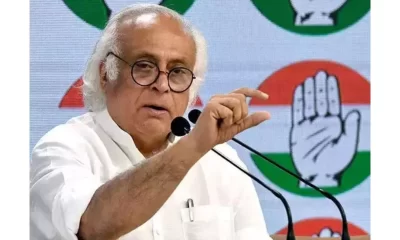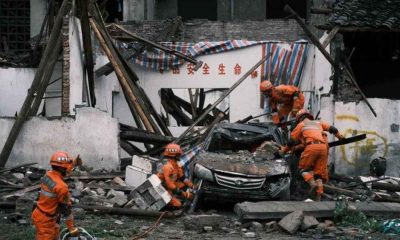India News
Army Chief: China Attempting to Change Status Quo
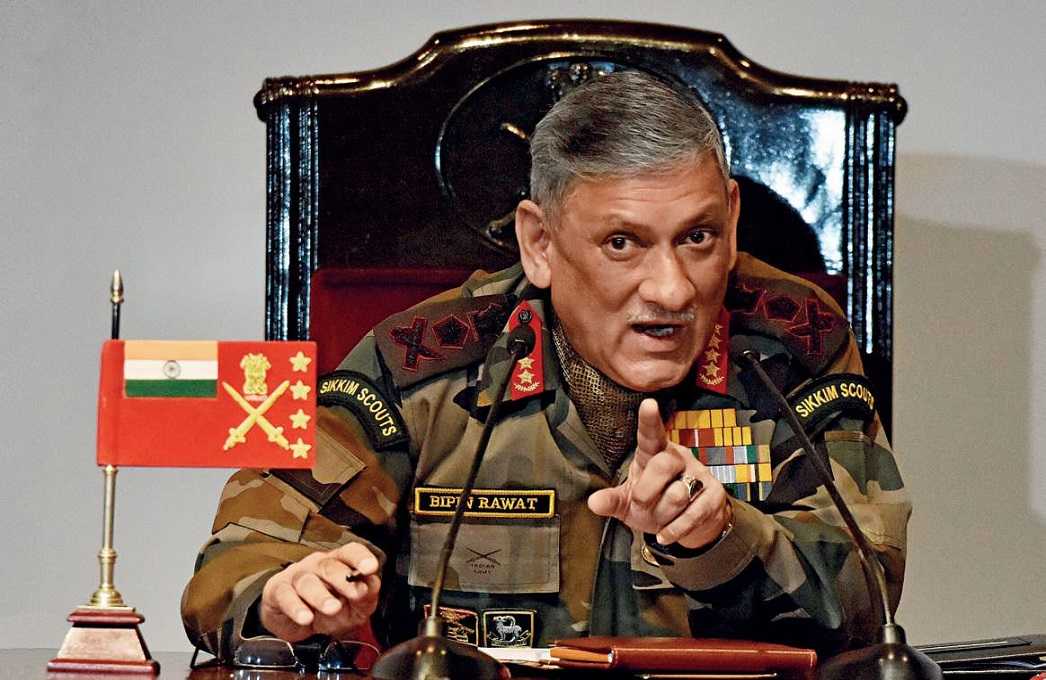
[vc_row][vc_column][vc_column_text]Warns that similar standoff incidents may increase in future
Sino-India standoff at Doklam is considered to be a matter of concern among defense experts around the world. This was echoed by India’s Army Chief General Bipin Rawat Saturday who has expressed concern over China’s attempt to “change the status quo” and expressed apprehension that Doklam like incidents may “increase” in future.
“The recent stand-off in the Doklam plateau by the Chinese side attempting to change the status quo are issues which we need to be wary about, and I think such kind of incidents are likely to increase in the future,” Rawat said.
While delivering General B C Joshi Memorial Lecture on ‘India’s Challenges in the Current Geo-Strategic Construct’ in Pune, he said “Pockets of dispute and contested claims to the territory continue to exist. These are due to differing perceptions on the alignments of the Line of Actual Control (LAC).”
“Transgressions across Line of Actual Control do happen and sometimes they do lead to some kind of misunderstanding between the forward troops. However, we do have joint mechanisms in place to address such situations,” said Rawat.
He said that during the flag meetings with Chinese counterparts, the Indian Army keeps insisting that both sides should return to the pre-June 16 positions (before the stand- off began), but no resolution has been found yet. “Now it is happening at the diplomatic and political level, as it needs to be resolved diplomatically and through political initiatives,” he said.
General Bipin Rawat further said that Chinese armed forces have made significant progress in capabilities for mobilization, application and sustenance of operations, particularly in the Tibet autonomous region of China.
“This is due to the development of force infrastructure of military significance. Their force reorganization along with developing capabilities in space and network-centric warfare is likely to provide them greater synergy in force application,” Rawat said.
While elaborating his statement that incidents like Doklam are likely to “increase”, Rawat told reporters that, “We should not be complacent. Let us say that this stand-off is resolved, but our troops should not feel that it cannot happen again in different sector.”
The Army Chief described about how China was growing its influence in the regional security environment. “It is doing so by increasing defense and economic partnerships in the neighborhood, especially in Pakistan, Maldives, Sri Lanka and Myanmar. He asserted that the China-Pakistan Economic Corridor (CPEC) passing through Pakistan-occupied Kashmir (PoK) challenges India’s sovereignty.”
He expressed his doubts if India-China joint exercises will take place this year, which is till date, is scheduled for October. Beijing has not yet confirmed if joint exercise will take place this year, he said.
Meanwhile General Rawat slammed Pakistan for waging a proxy war in Jammu & Kashmir and said the increasing fundamental ideologies in that country is a matter of grave concern.
“Pakistan’s unabated reliance and support to Jihadi groups have serious ramifications. This can lead to the possibility of Pakistan being a conduit for the eastward spread of fundamentalist and the Islamic ideology. This lends a complex dimension to the threat not only for us, but also for other countries of South and East Asia, including China,” Rawat said.[/vc_column_text][/vc_column][/vc_row]
India News
Sunita Kejriwal, Atishi meet Arvind Kejriwal in Tihar jail, discuss Delhi governance
AAP had earlier accused the Tihar jail administration of cancelling Sunita Kejriwal’s meeting with Arvind Kejriwal.
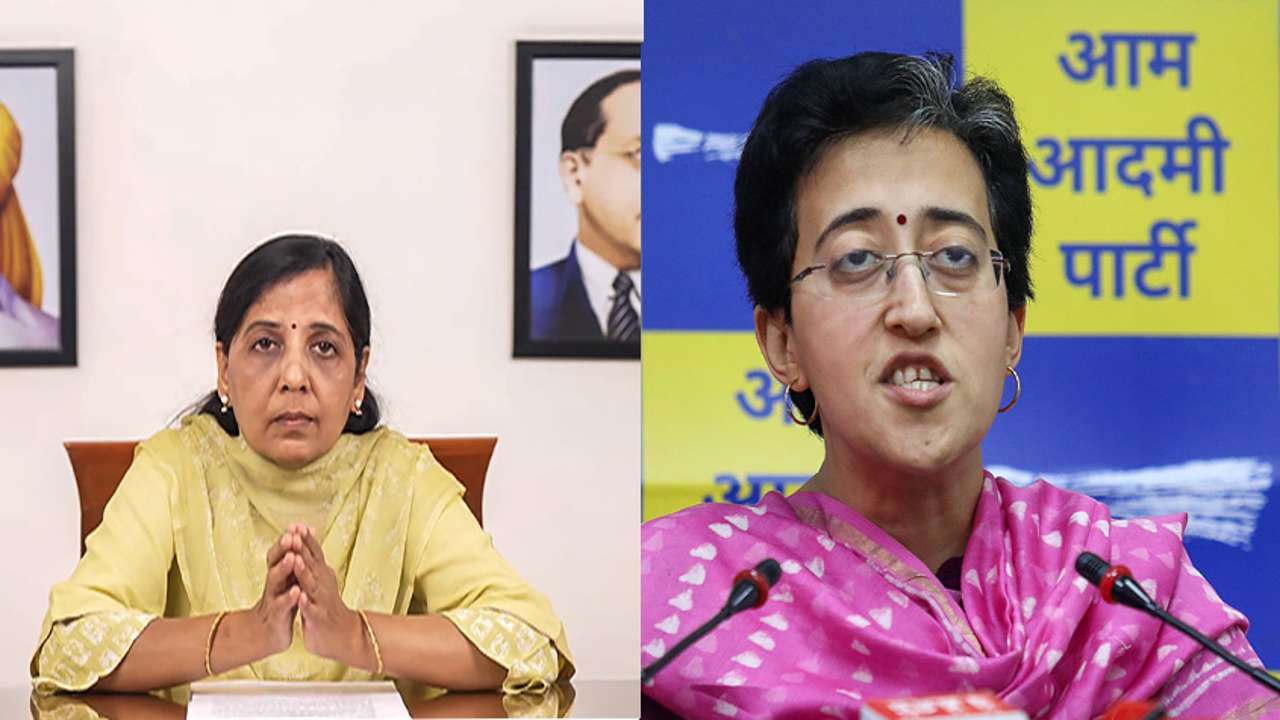
Delhi Chief Minister’s wife Sunita Kejriwal and AAP minister Atishi met Arvind Kejriwal in the Tihar Jail today. After their meeting, both dicussed the specifics of their meeting with CM. They said that the jailed CM was asking about the Delhi governance matter.
Kejriwal is expected to see Punjab Chief Minister Bhagwan Mann tomorrow.
Atishi, who is in charge of six departments in the Delhi Cabinet, said, she visited with the Chief Minister. When she asked how he was doing, he skipped answering her, rather he asked how the work is going in Delhi. He said, not to ask about his condition. During their meet, the Delhhi CM also asked about the school kids that are they getting books? Does Mohalla Clinic have access to medications? Atishi continued.
The Chief Minister said that as summer is approaching, Delhi shouldn’t have any water-related issues. He sent a message to the women of Delhi, saying he is planning to give them Rs 1000.
The Aam Aadmi Party had earlier claimed that Kejriwal’s wife, Sunita Kejriwal, was not allowed to see him. However, in a statement, Delhi minister Atishi said that Sunita Kejriwal will see her husband later on in the day and that two people were granted permission, but Sunita ji’s was cancelled. Athishi said, every day, new laws are enacted, she did not have permission, but when their lawyers won this legal battle, she was permitted to see Kejriwal.
AAP’s campaign for the Lok Sabha in the national capital and other states will be led by Mrs. Kejriwal, the party said. The campaign kicked off with a roadshow to support AAP’s candidate for East Delhi, Kuldeep Kumar. This is the first time that Mrs. Kejriwal has entered the political sphere actively.
Party leader Sanjay Singh asserted last week that Atishi’s name was added to the list of visitors for Mr. Kejriwal following the name of Delhi Health Minister Saurabh Bharadwaj.
Meanwhile, in the Delhi Liquor Policy case, Arvind Kejriwal was taken into custody in March. On March 21, the Enforcement Directorate (ED) detained him in connection with a money laundering case. In the same case, Manish Sisodia, his former deputy, is jailed.
India News
FIR filed against YouTube channel in Punjab for defaming AAP MP Raghav Chadha
The case was filed on the complaint of the son of an AAP candidate from the Ludhiana Lok Sabha seat.
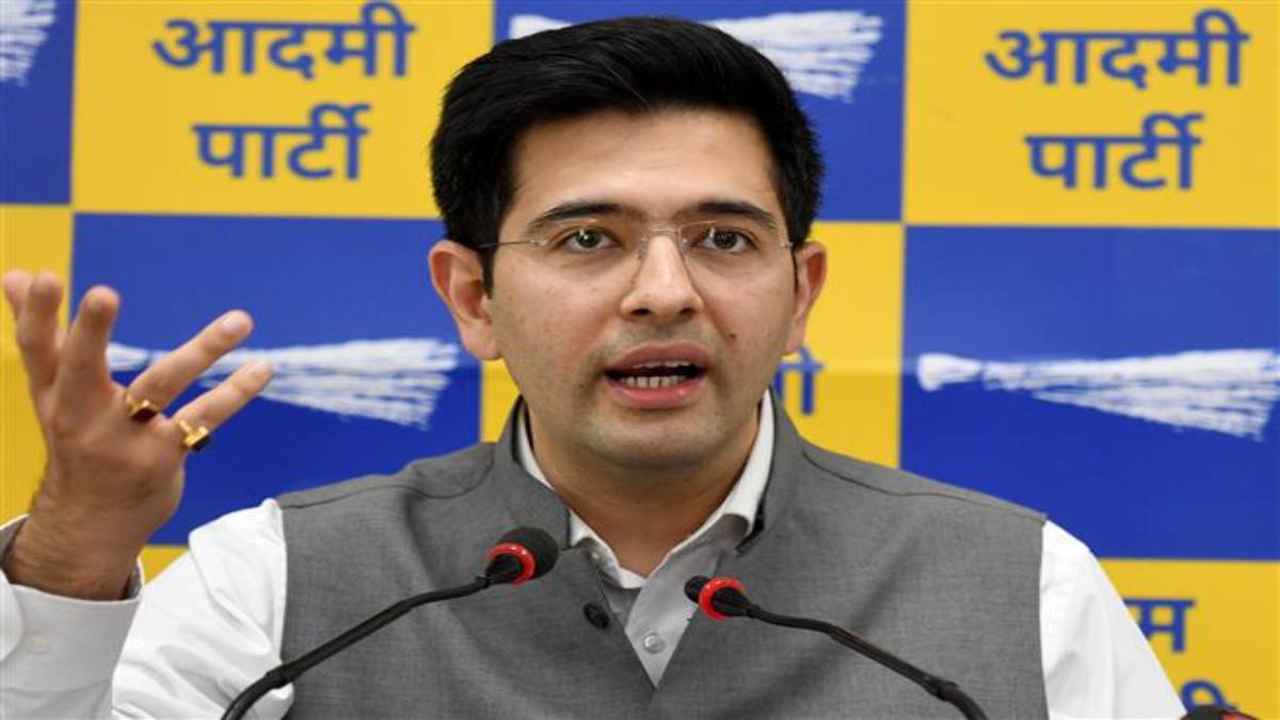
A First Information Report (FIR) has been filed by Punjab Police against a YouTube channel for allegedly linking Aam Aadmi Party (AAP) MP Raghav Chadha to wanted man Vijay Mallya.
The AAP candidate for the Ludhiana Lok Sabha constituency, Ashok Pappi Prashar’s son, Vikas Prashar, filed a formal complaint against the YouTube station Capital TV. The complainant held the channel accountable for airing misleading and defamatory content.
The statements/contents of false videos on Capital TV channel and others shall harm the public peace and harmony…and is likely to promote enmity between different groups in the country on grounds of religion, caste, race and community, the complaint said.
In his complaint, Vikas allegedly claimed that the YouTube channel was disseminating misleading information and that it was defaming Raghav Chadha by equating him with Mallya.
Vijay Mallya fled to the UK after taking public money, and similarly, a Rajya Sabha member left for England, claiming it was for eye treatment, according to the FIR, which noted claims made by the YouTube channel.
The AAP leader will reportedly get a vitrectomy in the UK to save the retina from detaching from the eye earlier. According to the research, this disorder, which is characterized by the formation of tiny holes in the retina, is very dangerous for vision and must be treated immediately to prevent irreversible damage.
The channel referred to Chadha as a Khalistani supporter following his encounter with UK MP Preet Gill, according to the complaint.
Section 153A of the Indian Penal Code (IPC) deals with inciting religious hatred among various groups, Section 469 deals with forgeries, and Section 505 deals with making statements that could incite public disturbances.
The FIR also contains Section 66 of the Information Technology Act, which addresses offenses involving computers.
India News
Security forces arrest 14 Pakistani nationals with around 86 kg of drugs, worth Rs 600 crore near Gujarat Coast
The Indian Coast Guard took to X and wrote in a breathtaking overnight operation, Indian Coast Guard undertook an intelligence-based anti-narcotics operation at sea on 28 Apr 24. About 86 kg of narcotics which is worth Rs 600 crore has been apprehended along with the arrest of 14 Pakistani nationals.
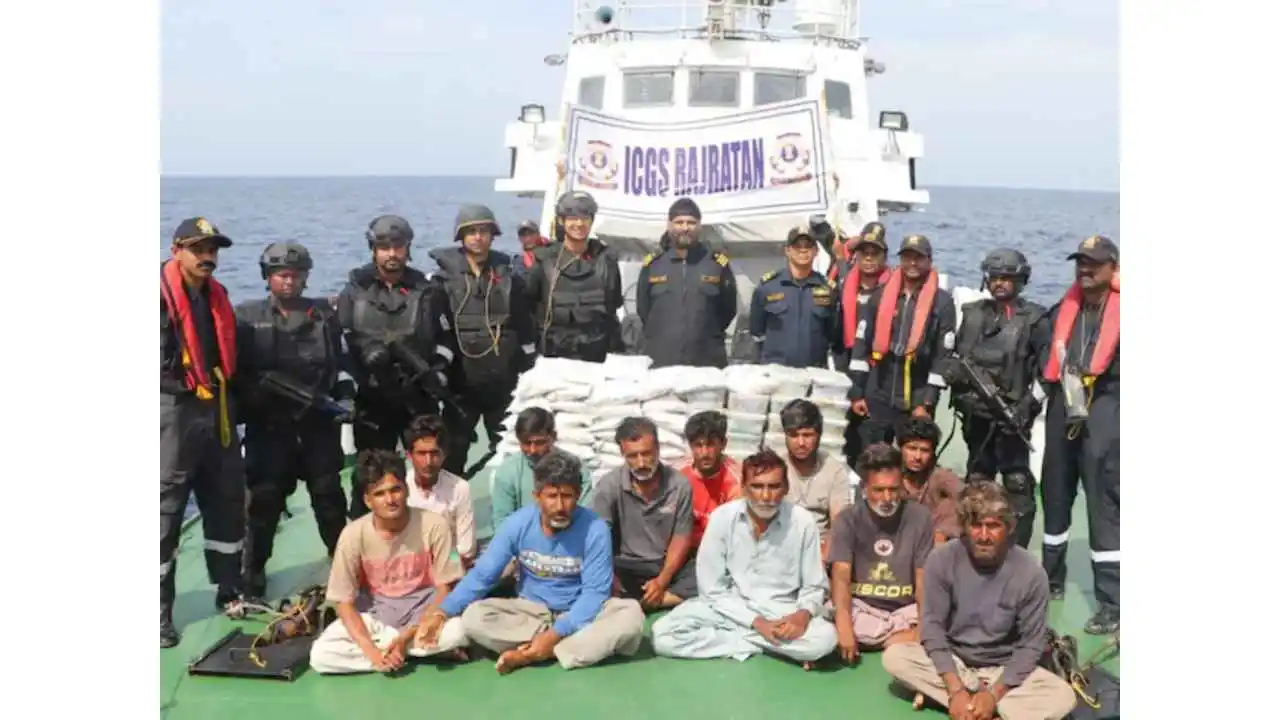
The Indian Coast Guard on Sunday announced the interception of a Pakistani vessel laden with 86 kg of narcotics valued at Rs 600 crore. Acting on intelligence, a joint operation involving the Indian Coast Guard, the Anti-terrorism Squad (ATS), and the Narcotics Control Bureau (NCB) was launched to combat drug trafficking in the area.
The operation was carried out by the agencies based on intelligence inputs received in the last few days. The Indian Coast Guard took to X and wrote in a breathtaking overnight operation, Indian Coast Guard undertook an intelligence-based anti-narcotics operation at sea on 28 Apr 24.
About 86 kg of narcotics which is worth Rs 600 crore has been apprehended along with the arrest of 14 Pakistani nationals. The operation was an epitome of inter-agency coordination wherein the Indian Coast Guard Anti-terrorism Squad and Narcotics Control Bureau collaborated seamlessly which resulted in the successful operation.
The ships and aircraft of the Indian Coast Guard had been deployed on concurrent missions to carry out the operation. ICG ship Rajratan, which had Narcitics Control Bureau and Anti Terrorist Squad officials embarked, positively identified the suspect boat.
No amount of evasive maneuvering tactics and resistance employed by the drug laden Pakistani boat could save it from the swift and strong action of ICG ship Rajratan. This operation took place on the basis of a tip-off by the Indian Coast Guard, Narcotics Control Bureau and Gujarat Anti-Terrorist Squad in the Arabian Sea near the International Maritime Boundary Line.
The operation was the 2nd major anti-narcotics operation carried out by the security forces in the Arabian Sea in 1 month. Earlier on February 26, 5 foreign nationals were held off the Porbandar coast with 3,300 kg of narcotics, including charas. Recently a boat carrying 60 packets of drugs was seized and 6 Pakistani crew members onboard the vessel were arrested off the Gujarat coast in a multi-agency operation in March.
-

 Entertainment22 hours ago
Entertainment22 hours agoIbrahim Ali Khan makes Instagram debut, first post goes viral
-

 Cricket news18 hours ago
Cricket news18 hours agoRohit Sharma to lead India at ICC Men’s T20 World Cup 2024, Hardik Pandya to be vice captain
-
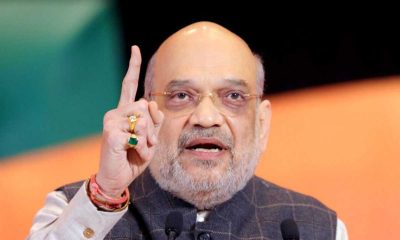
 Latest Politics News23 hours ago
Latest Politics News23 hours agoAmit Shah slams Congress over fake video, plays out actual video, says BJP supports reservation
-
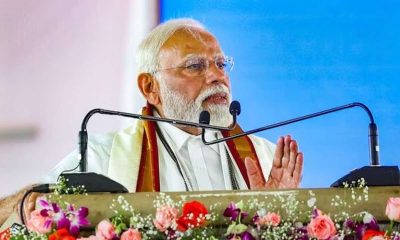
 2024 Lok Sabha Elections16 hours ago
2024 Lok Sabha Elections16 hours agoPM Modi says if Congress comes to power, they will bring out inheritance tax
-
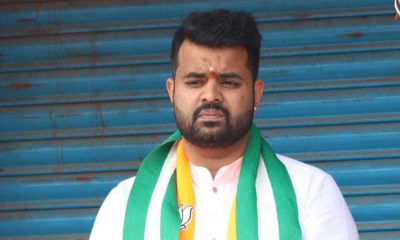
 Latest Politics News21 hours ago
Latest Politics News21 hours agoKarnataka MP Prajwal Revanna suspended from JDS over sex scandal



